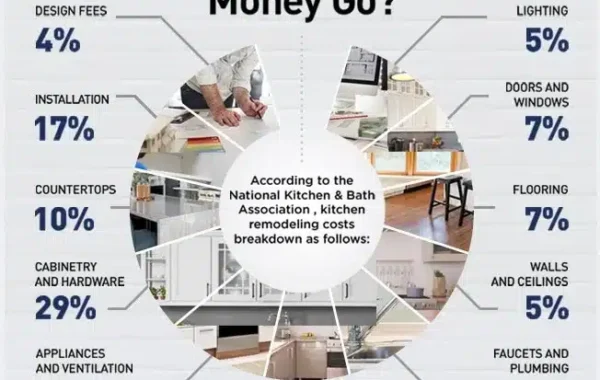Best General Contractors for Fix and Flippers Business
Navigating the world of fix-and-flip projects can be a whirlwind. Profit margins hinge on efficiency, cost control, and, critically, the quality of the renovations. While DIY has its place, experienced real estate investors understand the immense value of a reliable general contractor. Finding the right one is like adding a secret weapon to your arsenal. But with so many contractors out there, how do you pinpoint the best partners for your fix-and-flip business? This guide dives into the key considerations and best practices.
Why a Great GC is Crucial for Fix-and-Flippers
Beyond simply executing renovations, a skilled general contractor brings a suite of benefits to the table:
- Speed & Efficiency: Experienced crews complete projects faster, minimizing holding costs.
- Cost Management: Established relationships with suppliers often translate to better pricing on materials. Plus, they can anticipate potential cost overruns and suggest value-engineered solutions.
- Quality Workmanship: A reputable GC ensures the work meets or exceeds local building codes, reducing the risk of future issues and increasing the property’s appeal to buyers.
- Project Management: They handle scheduling, sub-contractor coordination, and permit acquisition, freeing up your time to focus on sourcing deals and marketing the finished product.
- Risk Mitigation: Experienced GCs are insured and bonded, protecting you from liability in case of accidents or subpar work.
Key Qualities to Look for in a Fix-and-Flip Contractor
Not all general contractors are created equal. Here’s what to prioritize when making your selection:
Proven Experience with Similar Projects
Look for contractors with a solid track record of successfully completing fix-and-flip renovations, ideally in the same area and price range as your target properties. A portfolio showcasing before-and-after photos and references from previous clients is invaluable. A contractor who specializes in kitchen remodels for luxury homes might not be the best fit for a quick, budget-conscious flip.
Strong Communication Skills
Clear, prompt, and proactive communication is essential. The GC should be readily available to answer your questions, provide regular updates, and proactively address any potential issues. A good test is how quickly they respond to your initial inquiry. Are they easy to reach and responsive to your needs?
Detailed Bids and Transparent Pricing
A comprehensive bid should break down all costs (labor, materials, permits, etc.) clearly and concisely. Be wary of contractors who offer suspiciously low bids or are unwilling to provide a detailed breakdown. Transparency is key to avoiding surprises down the line. Don’t be afraid to ask for clarification on any line item.
Solid Subcontractor Network
A GC is only as good as their subcontractors. Ensure they have a reliable network of licensed and insured plumbers, electricians, HVAC technicians, and other tradespeople. Ask about their vetting process for subs. A GC who consistently uses the same trusted subcontractors is often a sign of stability and quality.
Adherence to Deadlines and Budgets
While unforeseen issues can arise in any renovation project, a good GC should be able to manage the schedule and budget effectively. Ask about their project management processes and how they handle change orders. A GC that proactively flags potential delays or cost overruns demonstrates responsibility and transparency.
License, Insurance, and Bonding
This is non-negotiable. Verify that the contractor is properly licensed, insured (general liability and workers’ compensation), and bonded in your state or locality. This protects you from liability in case of accidents, property damage, or contractor default. Don’t just take their word for it—verify this information independently with the relevant authorities.
Finding and Vetting Potential Contractors
Here’s a structured approach to finding and vetting potential contractors:
- Seek Referrals: Ask other real estate investors, agents, property managers, or even local building supply stores for recommendations.
- Online Research: Check online reviews on platforms like Yelp, Google, and the Better Business Bureau. Pay attention to both the positive and negative feedback.
- Interview Multiple Contractors: Get bids from at least three contractors before making a decision. This allows you to compare pricing, experience, and communication styles.
- Check References: Contact previous clients to ask about their experience with the contractor. Be sure to ask about both the quality of the work and the overall project management.
- Review the Contract Carefully: Ensure the contract clearly outlines the scope of work, payment terms, timelines, and dispute resolution process. Have an attorney review the contract if you have any concerns.
Structuring Payment for Fix-and-Flip Projects
A common payment structure involves an initial deposit, followed by progress payments tied to specific milestones (e.g., completion of demolition, framing, plumbing, electrical, finishes). This protects both you and the contractor. A holdback (typically 5-10%) is often retained until all work is completed to your satisfaction and any outstanding issues are resolved.
From our experience, never pay the full amount upfront. Milestone-based payments ensure both parties are incentivized to keep the project on track and up to standard.
Long-Term Partnership vs. One-Off Projects
Ideally, you’ll want to cultivate a long-term relationship with a reliable general contractor. This provides consistency, streamlines the bidding process, and often results in better pricing over time. If you consistently deliver work to a contractor, they’ll value the relationship and be more likely to prioritize your projects.
The Takeaway
Finding the best general contractor for your fix-and-flip business is an investment that pays dividends. By prioritizing experience, communication, transparency, and a commitment to quality, you can build a team that accelerates your projects, maximizes your profits, and minimizes your stress. Remember that the cheapest option is rarely the best in the long run. Focus on value, reliability, and a contractor who understands the unique demands of the fix-and-flip world. Armed with these guidelines, you are now well-positioned to begin your search and forge a profitable partnership. Consider taking these points to a local real estate investing meetup to find recommended GCs in your area.

